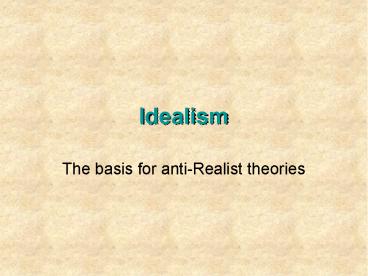Idealism - PowerPoint PPT Presentation
Title:
Idealism
Description:
Human rights concerns have no place in foreign policy, unless they happen to ... fight in war, but an active, democrat movement of common people can reverse this ... – PowerPoint PPT presentation
Number of Views:160
Avg rating:3.0/5.0
Title: Idealism
1
Idealism
- The basis for anti-Realist theories
2
- Should human rights be a top priority of American
foreign policy? - 2. What do we mean by human rights, what types
of rights?
3
Answers by political perspectives Realists
NO!! Human rights concerns have no place in
foreign policy, unless they happen to coincide
with the national interest (which essentially
means they are still secondary and used more for
propaganda). Idealists Yes!! A prime goal of
all politics is the improvement of the human
condition. Human rights are one aspect of a good
life.
4
Does this make Realists war-mongers, insensitive,
or inhumane?
- They would say no, they just value security first
and other goals or goods later.
5
Background -- Some would say that realism
emerged as a theory in response to idealism.
Others say idealism is a response to realist
tenets through history. Like realism, the
roots of idealism can be traced back for
centuries in various forms. We see strains of
idealism in the teachings of Christ, Buddha,
Muhammad, Mo Ti as well as other non-sectarian
teachings.
6
- There are ancient, medieval, and modern versions
of Idealism. - The modern form comes in a few forms pacifism,
liberalism, globalism, and ironically the
original writings of Marx and other anarchists. - Marx was a humanist (but not pacifist), but
actual communist leaders of 20th century were
Realists and often very brutal dictators. This
was a perversion of Marxs writings.
7
Forms of Idealism
Pacifists
Globalists
Humanitarian Marxists
Classical Liberals
War Bad Harmony of Interests Universal
Ethics People are Good Public Opinion
War bad overall Harmony of Interests Universal
Ethics People are Good Communism
War is Bad Morality Necessary People are
Good Public Opinion Democracy
War irrational Harmony of Interests Universal
Ethics Some Greed is Good Public
Opinion Democracy Capitalism
These are all Branches of Idealist Thought,
although there are contradictions between them
regarding some principles but also policy
prescriptions But all are optimists!!!
8
A pacifist is someone that does not believe in
violence as a way to settle disputes, or for any
other reason for that matter. A globalist is
someone that prefers to think of one human race
instead of many nations. There is only one
nation to a true globalist. Many globalists
believe that someday nation-states will
disappear. A liberal is someone that believes
that democracy and capitalism are the best ways
to unite people around the world.
9
- Idealism disagrees with realism, particularly
that the pursuit of power and war is amoral. - Idealism is more normative than realism.
- Realism attempts to explain how the world is
while idealism emphasizes what it could be. - idealism offers a normative prescription for the
conduct of politics.
10
Many idealists blamed realpolitik for WWI. In
other words, when people think like realists
conflict is more likely. Realism is a
self-fulfilling prophecy. Idealists would say
that not enough was done to limit the anarchy of
the international system. The League of
Nations was created to provide a firm basis for
international law and collective security, a
forum where differences could be resolved
peacefully.
11
Main Tenets of Idealism
- Universal Ethics -- All humans should abide by
common standards such as natural laws. There is
a universal ethic common to all people. - There is no special aspect of culture that makes
morality different from country to country. This
is an excuse on the part of dictators in the
opinion of idealists. In other words, idealists
claim cultural relativists are hypocrites.
12
- Peace is better than war -- War is seen as
immoral by idealists, by others is only as a last
resort and for a just cause. St Thomas Aquinas. - War is irrational Breakdown of rationality
according to idealists, whereas realists say it
becomes rational because of anarchy.
13
While realists believe real conflicts arise over
real disagreements, idealists tend to believe
that such conflicts could be avoided if states
sought to better understand each other. Thus,
there is much misperception and manipulation of
people in international relations that needs to
be reduced, according to idealists.
14
- Harmony of interests -- Idealists believe it is
possible for humans to live together in harmony
if the proper measures are taken. - The human race could live together in peace if
only we would come to believe that war and
violence are not the answer. (globalist and
humanists). - Conflict is not intrinsic of human existence as
realists claim war and violence are learned
behaviors, not intrinsic. (constructivists)
15
Liberals believe the full implementation of
democracy and capitalism could provide a harmony
interests wealth and the good life. War
disrupts economics wars are destructive and not
necessarily profitable, especially to most
individuals in the world.
16
- People are good Idealists are more optimistic
about human nature. In the proper setting, man
would enjoy peace and be free from conflict.
17
- The Power of Public Opinion People that are
active can take charge of politics. Political
leaders can manipulate common people to fight in
war, but an active, democrat movement of common
people can reverse this manipulation. - Again, war is irrational and avoidable, and
most individuals would not participate in war if
they were fully informed and had a free choice.
18
International Law and organization -- Idealists
put a lot of faith in international law and
intergovernmental organizations (IGOs) such as
the United Nations and International Court of
Justice to solve problems on the international
level. Prominent figures in this tradition
include Hugo Grotius and Woodrow Wilson.































